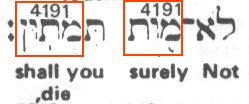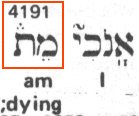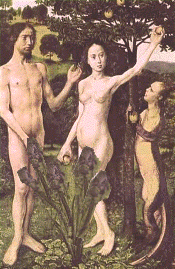|
|
There are some significantdifferences in the Hebrew words that have been translated as "die" and"surely die" in the recording of the communications of the Lord, Adam, Eve, and theserpent. The quote from the Scriptures that follow are Word by Word translations from the "Interlinear Bible" byJ. P. Green and following each passage there is a magnified selection from the "Interlinear Bible" which is included to show in detail the recorded Hebrew wordsthat are translated as die in each Passage. (Remember that Hebrew is read from right to left.)
"... Of every tree of the garden surely you may eat;
but of the tree of the knowledge of good and evil
not you shall eat from it;
in the day of your eating from it
surely you shall die". (Genesis 2:16-17)
Notice that the Hebrew word ( Strong's # 4191 ) is repeated which is a techniqueoften used in the Hebrew for emphasis and the last of the passage is often translatedmore literally as "dying thou shall die". A less literal translation is "for assoon as you eat of it, you shall be doomed to die". For we know from readingthe rest of the story the penalty was not sudden physical death, but as soon as the disobedienceoccurred Adam and Eve's relationship with the Lord was drastically changed and they werereduced to hiding in the bushes, the penalties were soon announced, and they werebanished from the garden to continue the rest of their life in toil and sorrows.
"And said the woman to the serpent.
Of the fruit of the trees of the garden we may eat,
but the fruit of the tree in the middle of the garden had said God,
not shall you eat of it, nor shall you touch it,
lest you die." (Genesis 3:2-3)

Notice that Eve did not repeat the form of the Words of the Lord! Insteadshe varied the Hebrew word translated as die and did not use the repeated wordform used for emphasis. She also added the phrase about not touching it. The word form she used is unusual and similar forms appear only in Numbers 16:29 and Isaiah 22:14 and in both of these occurrences it appears to mean a physical death under conditions of judgment. It would appear that in her statement she was possibly showing her uncertainty or lack of full understanding as to exactly when and what would be the result of disobedience and the seriousness of the penalty. Eve would seem to have no way of knowing about death unless she had witnessed the physical death of a plant or an animal.
"And said the serpent to the woman,
Not surely you shall die." (Genesis 3:4)
*
The reply of the serpent is phrased negatively and returns to the repeated word form but uses thesame word form as the Lord for the first word and the word of Eve for the second word.This repeated word form is unique and appears no where else in the Scriptures.Therefore, the reply seems to be directed to how Eve had phrased her answer andto be correcting her statement or adding special emphasis in a negativeway. There surely must be meanings within these Hebrew word changes that are notfully revealed by the translations. Looking in Strong's "Dictionary of the Words in the Hebrew Bible" we find the following.

Note that there is also the possible meaning, especially for the repeated word form,of a very sudden death. None of the translators have included the possibilitythat there is a sudden time implication in the words. Looking in "The Word" byIsaac E. Mozeson we see the following.

Indicating that the words translated as die are in a family of words whosevariations can also indicate a timeliness. The short two letter form is found a number of times in the later part of Genesis as shown in the selection below from Genesis 50:5. It would appear that Eve is either being corrected or gaining new information concerning the result of disobedience. Possibly the recorded serpent's reply could be more literally word for word translated as: It would appear that Eve is either being corrected or gaining new information concerning the result of disobedience. Possibly the recorded serpent's reply could be more literally word for word translated as:
"Not dying shall you die suddenly"
This would be contrary to what many have concluded, in that they have proposedthat the serpent was contradicting the Lord. Instead it is proposed that theserpent as "wise" or "subtil" was communing in truth, that is partial truths. The apparent confusion on Eve's part causes us to wonder if she fully understood all of the terrible consequences of disobedience.
It would appear that Eve by using the short form of to die, with the added vowel connectedn consonant, was saying that she believed that if she touched the fruit of the tree ofknowledge she at that moment would die. While the Lord was using a softer formof to die which did not necessarily indicate a sudden death. The serpent was then possibly informingher that the tree of knowledge was not about death, but as its name implied wasabout knowledge only. No information was given to explain how severely the act of disobediencewould be punished. Eve then saw that the fruit was pleasant to the eye and somehow even saw that it was good to eat. How she saw that it was good to eat is notexplained. Could it possible be that she witnessed the fruit being eaten, possiblyeven being eaten by the serpent?? And then
"she took of the fruit thereof, and did eat,
and gave also unto her husband with her; and he did eat.CONCLUSION: An alternate translation of the communication between the serpent and Eveis proposed which is believed to be more in line with the Masoretic Text and assuggested by Strong's dictionary. The new translation changes the serpent's answer to Eve from a direct contradiction to the Words of the Lord to that of informing Eve that the result of her disobedience will not be sudden physical death. A less literal variation of the translation could be
"You will not very suddenly die".
APPENDIX A: Does the Hebrew require that the serpent speak vocally?Answer: NO!
Verse 3:8 says that Adam and Eve heard the voice/sound of the Lord in the gardenand 3:17 says Adam listened to the voice of Eve. However,the Hebrew word used in the verses concerning the serpent, the Hebrew word usually translated as said, and transliterated as "amar" (Strong's#559) per Strong is a primary root, to say, but "used with great latitude".This translation latitude includes "said in his heart" of Genesis 17:7 and 27:41. "Think"of II Samuel 13:33 and of II Chronicles 13:8. And "commune" of Psalms 4:4.Therefore the Hebrew word can cover communications from vocal speech to private thoughts of theheart. We are told that the "serpent" was more "subtil/wise/cunning/clever" of allthe "wild beasts". Ask any pet owner that has a "clever" pet and most usuallythey will say that they can know what their pet is thinking and wants from its owner.Even many wild animals not considered as being so clever have a way of communicatingwith humans. The editor recentlyhad an experience when they were watering their garden inside a six foot high fenceon a very hot evening and there appeared a wild hen turkey and three babies just outsidethe fence, and even though being far from one "who talks with the animals",we could readily see that the birds wanted water and sprayed a puddle on the groundoutside the fence from which the birds rapidly quenched their thirst.
We have already discussed that quite possibly Eve saw the serpent eating of the fruitand possibly this was the primary way in which the temptation occurred. (By the way, the Hebrew word for serpent (from its hiss) is used in Isaiah 27:1 to describe the monster Leviathan, so it is possible that the serpent's appearance was not thatof a common snake.)It is then quite possible that the serpent "communed" with Eve totally without using vocal speech! Many scholars have seen it proper to assumethat Adam and Eve were of superior intelligence and that the "mother of all living" wouldhave a heightened sense of understanding for the animal kingdom.Visualize the serpent in or under the forbidden tree, eating of the fruit and obviouslyenjoying its self and then looking directly at Eve and continuing to joyously eat away. Couldnot this scenario easily communicate to Eve that the fruit is beautiful, goodtasting and non-poisonous? But we still have the problem of how she saw thatit was "a tree to be desired to make one wise". Eve said "of the treethat is in the midst of the garden", did she know that it was the "tree of theknowledge of good and evil" and understand the implications thereof due toinstructions from Adam, or did she assume it was a fruit for making one wisedue to her knowledge of the "cleverness" of the serpent and assume that the fruitwas the source of its wisdom? Strong informs us that as with many Hebrew words,the word "raah" (#7200), which is translated that Eve saw, can be literal orfigurative and therefore could be translated as she discerned or perceived.

[url]http://www.accuracyingenesis.com/die.html[/url]
|
|